人教版(2019)必修第三册Unit 4 Space Exploration 不定式作定语和状语课件(共26张PPT)
文档属性
| 名称 | 人教版(2019)必修第三册Unit 4 Space Exploration 不定式作定语和状语课件(共26张PPT) |
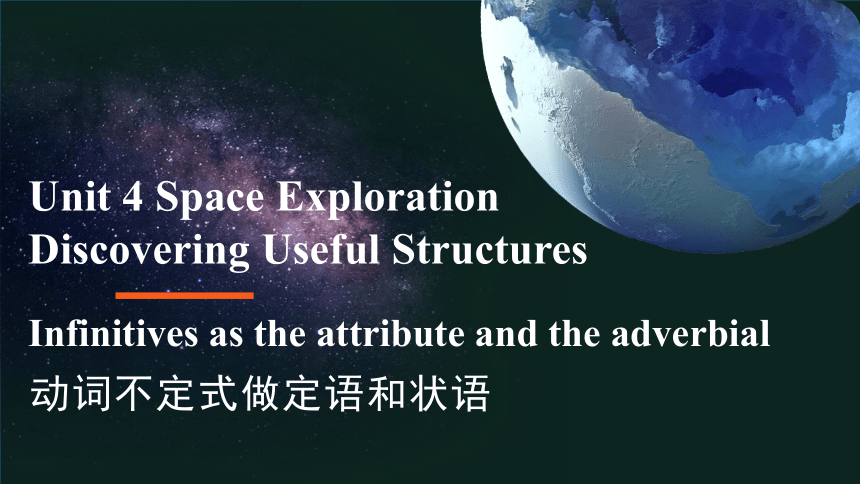
|
|
| 格式 | pptx | ||
| 文件大小 | 7.7MB | ||
| 资源类型 | 教案 | ||
| 版本资源 | 人教版(2019) | ||
| 科目 | 英语 | ||
| 更新时间 | 2023-07-22 00:00:00 | ||
图片预览

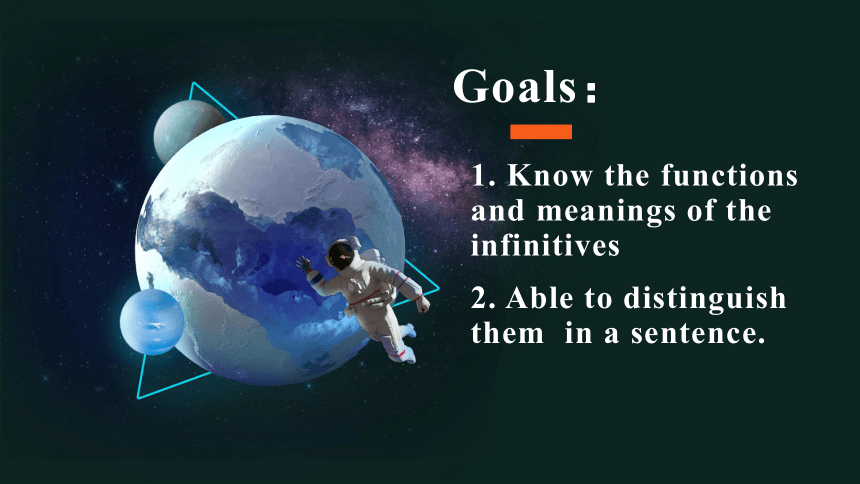


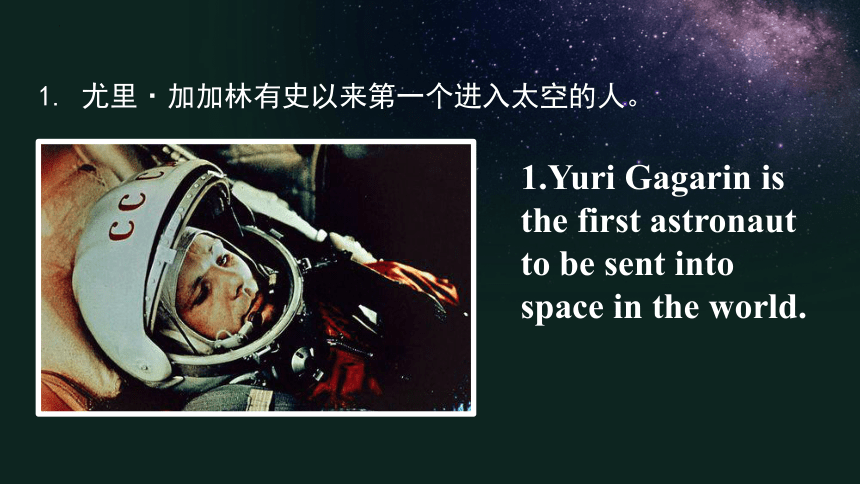
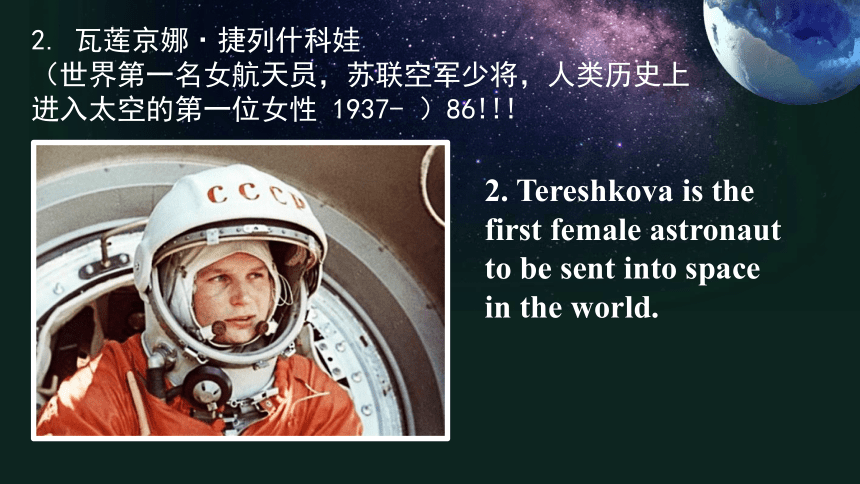
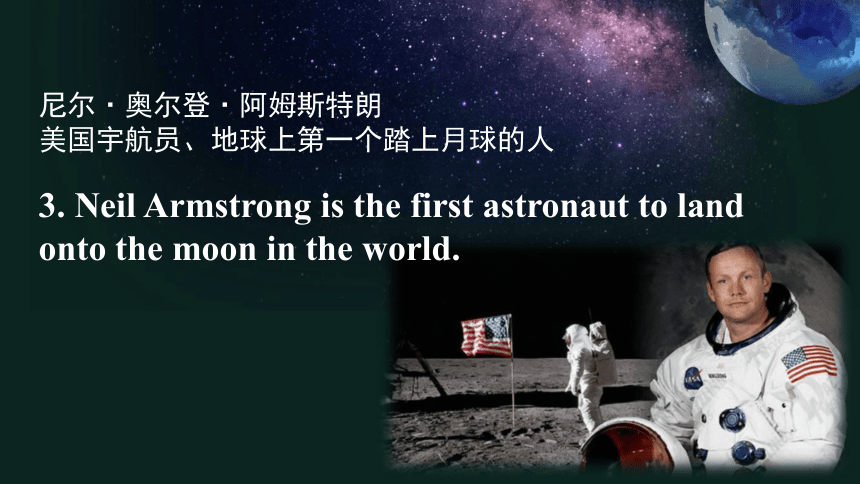
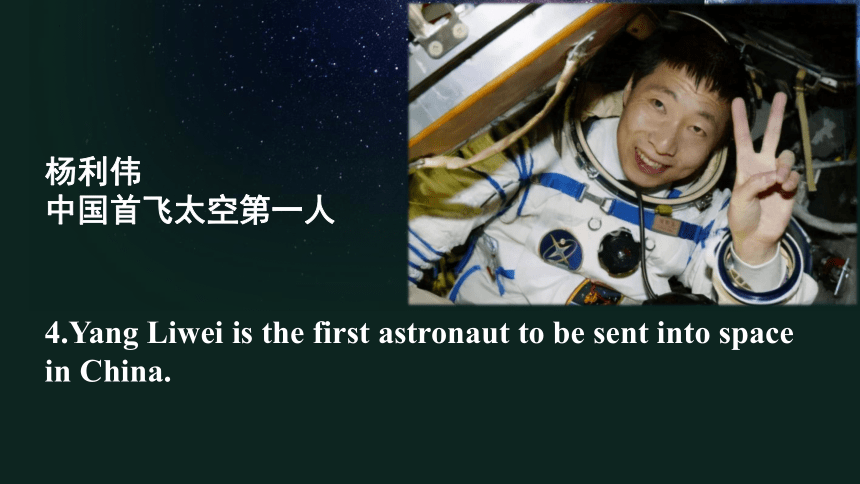
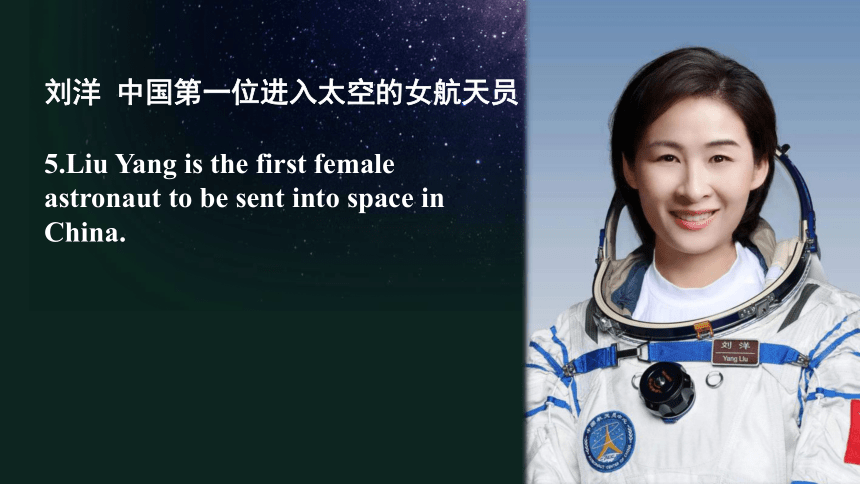
文档简介
(共26张PPT)
Unit 4 Space Exploration
Discovering Useful Structures
Infinitives as the attribute and the adverbial
动词不定式做定语和状语
Goals:
1. Know the functions and meanings of the infinitives
2. Able to distinguish them in a sentence.
To live abroad is not easy.
The question is how to get there.
She planned to visit her parents next week.
His father encouraged him to find a new job.
The first person to come is Mr. Brown.
He went to France to learn French.
以下不定式充当什么成分?
主语
宾语
表语
定语
宾补
状语
01
PART
动词不定式作定语的用法
1.Yuri Gagarin is the first astronaut to be sent into space in the world.
1. 尤里·加加林有史以来第一个进入太空的人。
2. Tereshkova is the first female astronaut to be sent into space in the world.
2. 瓦莲京娜·捷列什科娃
(世界第一名女航天员,苏联空军少将,人类历史上进入太空的第一位女性 1937- )86!!!
3. Neil Armstrong is the first astronaut to land onto the moon in the world.
尼尔·奥尔登·阿姆斯特朗
美国宇航员、地球上第一个踏上月球的人
4.Yang Liwei is the first astronaut to be sent into space in China.
杨利伟
中国首飞太空第一人
5.Liu Yang is the first female astronaut to be sent into space in China.
刘洋 中国第一位进入太空的女航天员
6.Wang Yaping is the first astronaut to teach in space in China.
王亚平
中国首位太空老师
1.Yuri Gagarin is the first astronaut to be sent into space in the world.
2. Tereshkova is the first female astronaut to be sent into space in the world.
3. Neil Armstrong is the first astronaut to land onto the moon in the world.
4.Yang Liwei is the first astronaut to be sent into space in China.
5.Liu Yang is the first female astronaut to be sent into space in China.
6.Wang Yaping is the first astronaut to teach in space in China.
1.What’s the similarity of these sentences
2. What’s the function of these infinitives
翻译:
1.尤里·加加林是世界上第一位被送入太空的宇航员。
2. 捷列什科娃是世界上第一位被送入太空的女宇航员。
3.尼尔·阿姆斯特朗是世界上第一位登上月球的宇航员。
4.杨利伟是中国首位被送入太空的宇航员。
5.刘洋是中国首位被送入太空的女宇航员。
6.王亚平是中国第一位在太空任教的宇航员。
Summary
The infinitives are used as 。
to modify(修饰) placed in front of it.
2. 土办法:翻译! 中文 ...的...
the attribitie (定语)
the nouns
找出下列句子中的不定式并指出其在句中的作用:
Looking up at the stars, people have always wanted to learn more about space, and scientists work hard to find answers.
They make vehicles to carry brave people into space to find out the secrets of the universe.
America’s NASA space agency launched Voyager 1 on 5 September 1977 to study deep space.
Then Shenzhou 6 and 7 completed a second manned orbit and the first Chinese spacewalk, followed by the vehicle Jade Rabbit being sent to the moon to study its surface.
More recently, China has sent Chang’e 4 to explore the surface of the far side of the moon to make measurements and observations.
宾语
目的状语
目的状语
目的状语
目的状语
目的状语
02
PART
动词不定式作状语的用法
1.作状语表示目的:
常用结构有in order to 和 so as to,但so as to不可位于句首。
为了学好英语,必须下苦功夫。
To learn English well,you must make painstaking efforts.
她一路快速奔跑为了赶上最后一班公共汽车。
She ran fast all the way so as to catch the last bus.
为了通过考试,简努力学习到午夜。
In order to pass the exam,Jane worked hard till midnight.
Jack has made great progress, (make )his parents very happy.
杰克取得了巨大的进步,这让他的父母很高兴。
Yesterday I went to see her (learn)that she had gone abroud a week before.
昨天我去看她,不料听人说她一周前出国了。
but only to learn
making
2. 作状语表示结果:
“令人意想不到”的结果,其中“使人不愉快的结果”较为常见。
有时前面加上only或 but only to do,以加强语气。
特别提醒
表示自然而然的结果,or有直接的因果关系:现在分词短语 ving
(2)动词不定式作结果状语时,常用于一些特定的结构中:
too..to do...太……而不能做……
so/such...as to do...如此……以至于做……
enough...to...足以做...
You're just too good to be true
你是那么美好而不像是真的
Can't take my eyes off you
难以将我的目光从你身上转移
动词不定式常跟在一些形容词之后说明产生某种情绪的原因。常见的形容词有happy, lucky,surprised,sorry, glad,delighted,anxious,interested, woried等。
学生们非常渴望知道考试结果。
The students are eager to know their test results.
作为中国青年我们感到自豪。
We are proud to be young people of China.
the infinitive can be used as 。
to indicate purpose/result/reason.
不定式作状语可以表示目的、结果、原因。
Summary
the adverbial
the infinitive
不定式
除了谓语,其他句子成分都能充当
定语
状语
修饰名词
土办法:翻译! 中文 ...的...
目的
结果
原因
为了...
“令人意想不到”的结果 to do
自然而然的结果ving
too..to do
so/such...as to do
enough ...to...
情绪adj
Summary
1 Look at the following sentences and focus on the italicised infinitives. In pairs, discuss their functions and meanings. Find more examples from the unit.
1 I trained for a long time to fly airplanes as a fighter pilot.
2 As we all know, an astronaut needs to be healthy and calm in order to work in space.
3 First of all, you must be intelligent enough to get a related college degree.
4 Some scientists were determined to help humans realise their dream to explore space.
5 On 12 April 1961, Yuri Gagarin became the first person in the world to go into space.
P. 42
目的状语
目的状语
结果状语
定 语
定 语
2 Rewrite the sentences using infinitives or “in order to/so as to + do”. Change
the italicised parts accordingly.
3. Mankind has always been curious about the universe and many people have dreamt that one day they would fly into space.
4. Astronauts’ bones and muscles can get very weak in space due to the lack of gravity, so they need to exercise every day, which will help them stay healthy.
Mankind has always been curious about the universe and many people have the dream to fly into space one day.
...they need to exercise every day to / in order to / so as to stay healthy.
5. Astronauts have to use tape to stick everything down while working in space because everything would float off otherwise.
6. During a spacewalk, astronauts have to move slowly so that they can keep their bodies under control.
Astronauts have to use tape to stick everything down while working in space to / in order to / so as to keep everything from floating off.
During a spacewalk, astronauts have to move slowly to / in order to / so as to keep theirbodies under control.
3 Complete the passage with the correct forms of the verbs in brackets.
Sending people to other planets or even beyond the solar system is not an easy goal _________(achieve). One of the problems is that the trip would take a very long time. For example, _____ (use) current technology, it would take over two years _____ (get) to the closest planet, Mars, and back. Although light is the fastest thing (know) in the universe, it could take more than four years to reach the nearest star system. Will scientists figure out a way _______ (store) sufficient food and water for the long journey Is it possible to travel faster than light No one knows the answers yet. However, space scientists never give up. They are experimenting with growing crops in space so as _______ (help) astronauts get enough food
on longer journeys through space.
to achieve
to get
to store
to help
using
不定式作定语时一般放在哪里?
作定语的不定式和名词有什么关系呢?
什么时候会用不定式作定语?
Where is the infinitive used as attributive
What does the infinitive have to do with the noun
When do you use infinitive as attributive
位置关系
* 不定式作定语的位置和关系
1. We must find a person to do the work.
2. There are lots of interesting things to see.
3. The medical teams got the order not to leave Wuhan when
the epidemic was contained.
主谓关系sb do
动宾关系do sth
同位关系
①通常放在名词、代词或不定代词后面作后置定语。
②与所修饰的名词构成主谓关系、动宾关系、同位关系
用法
不定式作定语的4种情况:
1. 当名词被序数词、最高级或 the only, the next, the last, the right修饰时,用不定式主动形式作定语。
She is the first graduate to be admitted in the big company.
Do you know which is the best route to take
She found the right person to marry.
Exercise:
1. He is the only person (know) the truth.
2. LQZ was the first woman (hire) as a residential physician in the OB-GYN department of the PUMC Hospital.
to know
to be hired
2. 与抽象名词连用如:wish, decision,chance,promise, plan, time, attempt, effort, ability, eagerness (等表示企图、努力、愿望、打算、能力等意义的名词)
改错:
A good teacher must have the ability making himself understood.
He made an attempt getting an offer in the big companv.
In the past, women had no chance go to school.
You must keep the promise pay on time.
to make
to get
to go
to pay
3、修饰不定代词
当修饰的词为something, nothing, anything等不定代词时,
1. Do you have anything to say
2. There is nothing to worry about.
3. Would you like something to drink
四、表将来未做的动作
1. The letter to be written is for my mom.
2. The matter to be discussed next meeting is of significance.
1. 当名词被序数词、最高级或 限定词(the only, the next, the last)修饰
2. 与抽象名词连用 chance,promise, plan, time, attempt...
3. 修饰不定代词 something, nothing, anything
4. 表将来还没发生的动作
Unit 4 Space Exploration
Discovering Useful Structures
Infinitives as the attribute and the adverbial
动词不定式做定语和状语
Goals:
1. Know the functions and meanings of the infinitives
2. Able to distinguish them in a sentence.
To live abroad is not easy.
The question is how to get there.
She planned to visit her parents next week.
His father encouraged him to find a new job.
The first person to come is Mr. Brown.
He went to France to learn French.
以下不定式充当什么成分?
主语
宾语
表语
定语
宾补
状语
01
PART
动词不定式作定语的用法
1.Yuri Gagarin is the first astronaut to be sent into space in the world.
1. 尤里·加加林有史以来第一个进入太空的人。
2. Tereshkova is the first female astronaut to be sent into space in the world.
2. 瓦莲京娜·捷列什科娃
(世界第一名女航天员,苏联空军少将,人类历史上进入太空的第一位女性 1937- )86!!!
3. Neil Armstrong is the first astronaut to land onto the moon in the world.
尼尔·奥尔登·阿姆斯特朗
美国宇航员、地球上第一个踏上月球的人
4.Yang Liwei is the first astronaut to be sent into space in China.
杨利伟
中国首飞太空第一人
5.Liu Yang is the first female astronaut to be sent into space in China.
刘洋 中国第一位进入太空的女航天员
6.Wang Yaping is the first astronaut to teach in space in China.
王亚平
中国首位太空老师
1.Yuri Gagarin is the first astronaut to be sent into space in the world.
2. Tereshkova is the first female astronaut to be sent into space in the world.
3. Neil Armstrong is the first astronaut to land onto the moon in the world.
4.Yang Liwei is the first astronaut to be sent into space in China.
5.Liu Yang is the first female astronaut to be sent into space in China.
6.Wang Yaping is the first astronaut to teach in space in China.
1.What’s the similarity of these sentences
2. What’s the function of these infinitives
翻译:
1.尤里·加加林是世界上第一位被送入太空的宇航员。
2. 捷列什科娃是世界上第一位被送入太空的女宇航员。
3.尼尔·阿姆斯特朗是世界上第一位登上月球的宇航员。
4.杨利伟是中国首位被送入太空的宇航员。
5.刘洋是中国首位被送入太空的女宇航员。
6.王亚平是中国第一位在太空任教的宇航员。
Summary
The infinitives are used as 。
to modify(修饰) placed in front of it.
2. 土办法:翻译! 中文 ...的...
the attribitie (定语)
the nouns
找出下列句子中的不定式并指出其在句中的作用:
Looking up at the stars, people have always wanted to learn more about space, and scientists work hard to find answers.
They make vehicles to carry brave people into space to find out the secrets of the universe.
America’s NASA space agency launched Voyager 1 on 5 September 1977 to study deep space.
Then Shenzhou 6 and 7 completed a second manned orbit and the first Chinese spacewalk, followed by the vehicle Jade Rabbit being sent to the moon to study its surface.
More recently, China has sent Chang’e 4 to explore the surface of the far side of the moon to make measurements and observations.
宾语
目的状语
目的状语
目的状语
目的状语
目的状语
02
PART
动词不定式作状语的用法
1.作状语表示目的:
常用结构有in order to 和 so as to,但so as to不可位于句首。
为了学好英语,必须下苦功夫。
To learn English well,you must make painstaking efforts.
她一路快速奔跑为了赶上最后一班公共汽车。
She ran fast all the way so as to catch the last bus.
为了通过考试,简努力学习到午夜。
In order to pass the exam,Jane worked hard till midnight.
Jack has made great progress, (make )his parents very happy.
杰克取得了巨大的进步,这让他的父母很高兴。
Yesterday I went to see her (learn)that she had gone abroud a week before.
昨天我去看她,不料听人说她一周前出国了。
but only to learn
making
2. 作状语表示结果:
“令人意想不到”的结果,其中“使人不愉快的结果”较为常见。
有时前面加上only或 but only to do,以加强语气。
特别提醒
表示自然而然的结果,or有直接的因果关系:现在分词短语 ving
(2)动词不定式作结果状语时,常用于一些特定的结构中:
too..to do...太……而不能做……
so/such...as to do...如此……以至于做……
enough...to...足以做...
You're just too good to be true
你是那么美好而不像是真的
Can't take my eyes off you
难以将我的目光从你身上转移
动词不定式常跟在一些形容词之后说明产生某种情绪的原因。常见的形容词有happy, lucky,surprised,sorry, glad,delighted,anxious,interested, woried等。
学生们非常渴望知道考试结果。
The students are eager to know their test results.
作为中国青年我们感到自豪。
We are proud to be young people of China.
the infinitive can be used as 。
to indicate purpose/result/reason.
不定式作状语可以表示目的、结果、原因。
Summary
the adverbial
the infinitive
不定式
除了谓语,其他句子成分都能充当
定语
状语
修饰名词
土办法:翻译! 中文 ...的...
目的
结果
原因
为了...
“令人意想不到”的结果 to do
自然而然的结果ving
too..to do
so/such...as to do
enough ...to...
情绪adj
Summary
1 Look at the following sentences and focus on the italicised infinitives. In pairs, discuss their functions and meanings. Find more examples from the unit.
1 I trained for a long time to fly airplanes as a fighter pilot.
2 As we all know, an astronaut needs to be healthy and calm in order to work in space.
3 First of all, you must be intelligent enough to get a related college degree.
4 Some scientists were determined to help humans realise their dream to explore space.
5 On 12 April 1961, Yuri Gagarin became the first person in the world to go into space.
P. 42
目的状语
目的状语
结果状语
定 语
定 语
2 Rewrite the sentences using infinitives or “in order to/so as to + do”. Change
the italicised parts accordingly.
3. Mankind has always been curious about the universe and many people have dreamt that one day they would fly into space.
4. Astronauts’ bones and muscles can get very weak in space due to the lack of gravity, so they need to exercise every day, which will help them stay healthy.
Mankind has always been curious about the universe and many people have the dream to fly into space one day.
...they need to exercise every day to / in order to / so as to stay healthy.
5. Astronauts have to use tape to stick everything down while working in space because everything would float off otherwise.
6. During a spacewalk, astronauts have to move slowly so that they can keep their bodies under control.
Astronauts have to use tape to stick everything down while working in space to / in order to / so as to keep everything from floating off.
During a spacewalk, astronauts have to move slowly to / in order to / so as to keep theirbodies under control.
3 Complete the passage with the correct forms of the verbs in brackets.
Sending people to other planets or even beyond the solar system is not an easy goal _________(achieve). One of the problems is that the trip would take a very long time. For example, _____ (use) current technology, it would take over two years _____ (get) to the closest planet, Mars, and back. Although light is the fastest thing (know) in the universe, it could take more than four years to reach the nearest star system. Will scientists figure out a way _______ (store) sufficient food and water for the long journey Is it possible to travel faster than light No one knows the answers yet. However, space scientists never give up. They are experimenting with growing crops in space so as _______ (help) astronauts get enough food
on longer journeys through space.
to achieve
to get
to store
to help
using
不定式作定语时一般放在哪里?
作定语的不定式和名词有什么关系呢?
什么时候会用不定式作定语?
Where is the infinitive used as attributive
What does the infinitive have to do with the noun
When do you use infinitive as attributive
位置关系
* 不定式作定语的位置和关系
1. We must find a person to do the work.
2. There are lots of interesting things to see.
3. The medical teams got the order not to leave Wuhan when
the epidemic was contained.
主谓关系sb do
动宾关系do sth
同位关系
①通常放在名词、代词或不定代词后面作后置定语。
②与所修饰的名词构成主谓关系、动宾关系、同位关系
用法
不定式作定语的4种情况:
1. 当名词被序数词、最高级或 the only, the next, the last, the right修饰时,用不定式主动形式作定语。
She is the first graduate to be admitted in the big company.
Do you know which is the best route to take
She found the right person to marry.
Exercise:
1. He is the only person (know) the truth.
2. LQZ was the first woman (hire) as a residential physician in the OB-GYN department of the PUMC Hospital.
to know
to be hired
2. 与抽象名词连用如:wish, decision,chance,promise, plan, time, attempt, effort, ability, eagerness (等表示企图、努力、愿望、打算、能力等意义的名词)
改错:
A good teacher must have the ability making himself understood.
He made an attempt getting an offer in the big companv.
In the past, women had no chance go to school.
You must keep the promise pay on time.
to make
to get
to go
to pay
3、修饰不定代词
当修饰的词为something, nothing, anything等不定代词时,
1. Do you have anything to say
2. There is nothing to worry about.
3. Would you like something to drink
四、表将来未做的动作
1. The letter to be written is for my mom.
2. The matter to be discussed next meeting is of significance.
1. 当名词被序数词、最高级或 限定词(the only, the next, the last)修饰
2. 与抽象名词连用 chance,promise, plan, time, attempt...
3. 修饰不定代词 something, nothing, anything
4. 表将来还没发生的动作
